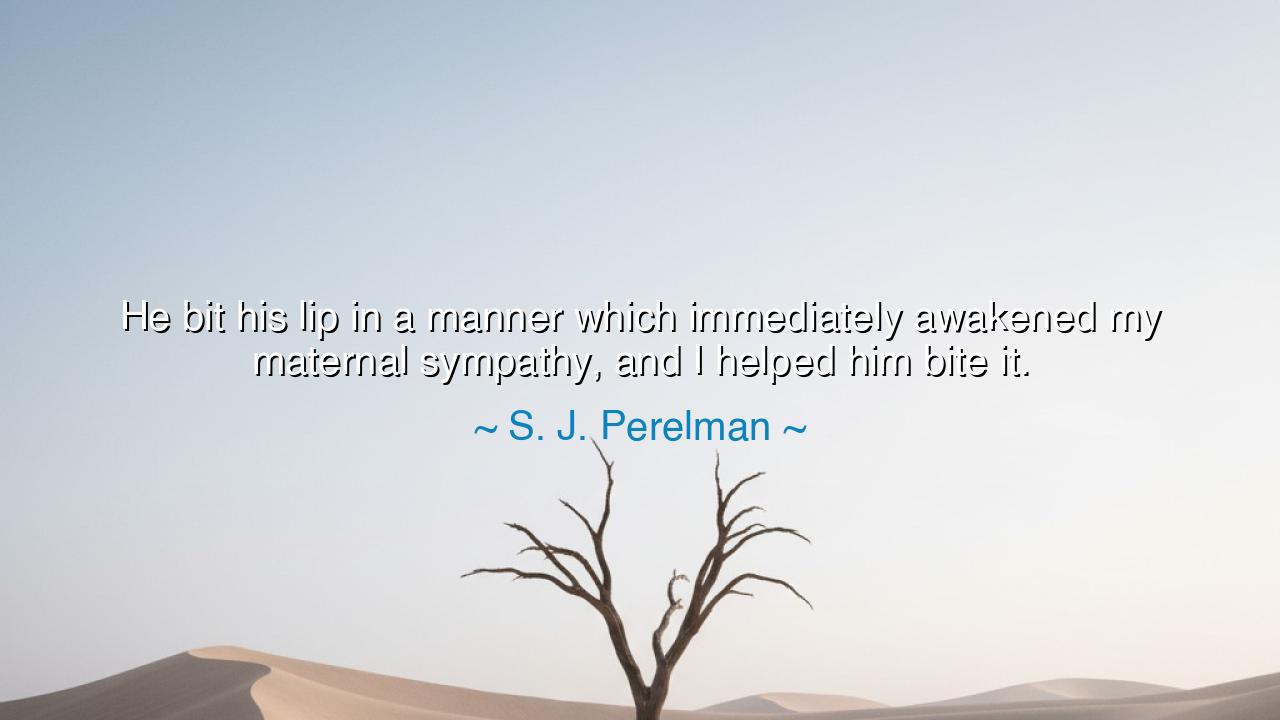
He bit his lip in a manner which immediately awakened my
He bit his lip in a manner which immediately awakened my maternal sympathy, and I helped him bite it.






In the depths of the human heart, there exists an enduring power—the ability to feel sympathy for others, to respond to their emotional cues with an instinctive understanding. S. J. Perelman’s words, “He bit his lip in a manner which immediately awakened my maternal sympathy, and I helped him bite it,” speak to this profound connection between one human being and another. In those few words, Perelman captures a moment of human vulnerability and the natural response it evokes in those around us. The gesture, the biting of the lip, is an ancient sign of nervousness, discomfort, or anticipation, and the sympathy it awakens speaks to the timeless human ability to recognize another’s emotional state and respond with care, even when that response seems paradoxical, as it is here.
In the ancient world, the notion of sympathy was not just a passing emotion but a core element of human connection. The Greeks, with their rich mythology, often depicted moments of deep human vulnerability and empathy. The gods themselves were often shown to be moved by the suffering or desires of mortals. Hera, for example, though a goddess of immense power, displayed a complex sympathy for certain mortal figures, even when that sympathy was mingled with resentment or frustration. Sympathy, then, was not just a simple feeling—it was the emotional thread that connected the divine and the human, the strong and the weak. In Perelman’s quote, we see a similar recognition of vulnerability—the act of biting one’s lip signifies an internal struggle or emotion, and the speaker’s reaction is one of recognition and care, even if it involves a touch of irony.
The concept of maternal sympathy is deeply embedded in the stories of ancient mothers and their relationships with their children. Demeter, the Greek goddess of the harvest, represents the ultimate maternal figure, whose love and grief for her daughter Persephone are central themes in the ancient Eleusinian Mysteries. Her story is one of love, loss, and the unbreakable bond between mother and child. Demeter’s journey through the seasons of mourning and reunion with her daughter teaches us that sympathy, particularly maternal sympathy, has the power to transcend separation and pain, forging connections that are both enduring and transformative. Perelman’s quote evokes this same idea, where sympathy is sparked by a simple gesture, and the response, although seemingly trivial—helping someone to bite their lip—becomes an expression of deep compassion and understanding.
In a broader sense, the quote also speaks to the complex nature of human interactions. The notion of helping someone with a simple, innocuous act—a gesture as small as the biting of a lip—is paradoxically profound. In Roman society, the moral philosophers like Seneca and Epictetus often emphasized the importance of maintaining composure and rationality in times of stress. However, these philosophers also recognized the human need for connection, for compassion, and for understanding. The Stoics, though often associated with detachment, still acknowledged that the bonds between individuals could and should be strengthened by mutual empathy. Just as Seneca wrote that “the greatest wealth is to live content with little,” he also emphasized the importance of emotional bonds that sustained individuals through hardship. In this light, Perelman’s comment on maternal sympathy and the act of helping illustrates the balance between reason and human connection—how even small actions can reflect a deeper emotional bond.
The irony in Perelman’s words adds another layer of depth. It is sympathetic, yes, but also somewhat playful—the speaker helps the other person bite their lip, an action that seems to exacerbate the very discomfort it is meant to address. This subtle humor underscores an important aspect of human sympathy—it is not always about solving someone’s problems or taking away their discomfort, but about simply acknowledging their struggle and standing in it with them. Sympathy, then, does not always demand a solution; sometimes, it simply asks for a shared understanding, a recognition of the other person’s emotional world. This approach to sympathy is embodied in the art of listening and witnessing, where the greatest act of care is the act of being present with another person in their vulnerability.
The lesson to be learned from Perelman’s quote is one of awareness and presence. True sympathy, as demonstrated in this seemingly trivial exchange, is not about fixing or solving the issue at hand, but about showing that we see the other person and their emotions. The act of helping someone to bite their lip becomes a symbol of our shared humanity—the idea that we are all connected through our vulnerabilities, and in those moments of struggle, we offer our presence and understanding. This kind of sympathy, simple yet profound, is the foundation of true empathy—the ability to witness another’s pain, discomfort, or joy without judgment, and offer support in whatever form it takes.
In our own lives, we must strive to be aware of the small gestures that reflect deeper connections. Let us not overlook the small moments—the unspoken signs of struggle or the seemingly trivial acts that speak volumes about another person’s emotional world. Whether in our relationships with friends, family, or even strangers, we can offer sympathy not by solving problems, but by being present, by showing that we recognize the humanity of others, and by offering care in the most genuine and simple ways. Like the ancient figures of wisdom who saw the depth of the human condition, let us remember that it is often the small, seemingly insignificant acts of compassion that forge the strongest bonds between us.






AAdministratorAdministrator
Welcome, honored guests. Please leave a comment, we will respond soon